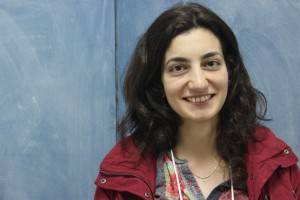Kurdish liberation movement committed to ‘democratic socialism for the 21st century’

[For more on the struggle of the Kurdish people, click HERE.]
Meral Cicek interviewed by the Rosa Luxemburg Foundation’s Florian Wilde during the World Social Forum in Tunis, translated by Leandros Fischer
April 9, 2015 – Links International Journal of Socialist Renewal – Meral Cicek (above) is from Cologne and is the chair of Kürt Kadın İlişkiler Merkezi, the Kurdish Centre for Women´s Affairs in Erbil.
* * *
The “Arab Spring” has turned into an “Arab Winter” in many places. The only example where elements of an alternative form of social organisation are visible is the autonomous northern Syrian region of Rojava, which is mainly inhabited by Kurds. Has the Arab left reflected on this experience?
This has been the case so far, although not as much as we would have hoped. My impression is that the Arab left still clings on to concepts from the 20th century, to nationalism and the fixation on the state. This is where an engagement with the concepts and strategies of democratic confederalism, as conceived by Abdullah Öcalan and currently implemented by the Kurdish movement, can open up a new perspective. But it is also we as the Kurdish left who have a duty to seek an exchange of opinions more actively.
You are the chairwoman of the Kurdish Centre for Women´s Affairs in Erbil. Does your work focus exclusively on Kurdistan or do you seek dialogue with the wider region?
We are a very young organisation. In fact, it has been less than a year since we were founded.
We try on the one hand to strengthen relations between women´s organisations in all four parts of Kurdistan and to develop a deeper foundation for our common work based on our diversity. We participate in the construction of a united women’s front in Kurdistan, especially now given the attacks by the “Islamic State”. We have to defend our dignity, our people, our gender and our values. We try on the other hand to communicate the experiences of our women’s liberation movement beyond Kurdistan to the wider Middle East.
Europe has long been the focus of our work abroad. Today, the Middle East has become more central.
The model of a democratic confederalism, like the one we’re building in Rojava and based on self-management, ecology and women´s liberation, can set an example for other struggles in the region. We’ve seen during the Arab Spring that the people were not adequately prepared for such a process. We have to better prepare ourselves for the next round of upheavals.
How valid is the impression that socialism as a final goal and as a method has subsided within Kurdish movement in favour of other concepts?
I don’t think that we’re moving away from socialist concepts. The leftist Kurdish liberation movement was always inspired by socialism and still is. But it tries to further theoretically develop the idea of socialism and to link the different struggles in the Middle East to a socialist perspective.
The change of paradigm within the Kurdish movement was the result of our reflection on the collapse of “really existing socialism”, which spawned a series of entirely new concepts like communalism, democratic confederalism and democratic autonomy. But what we mean by these is essentially a form of democratic socialism for the 21st century.
What is the significance of this year’s World Social Forum (WSF) for the Kurdish left?
The social question and the concept of society in general have acquired more and more significance for the Kurdish liberation movement over the last few years. The WSF gives us the opportunity converse with leftist, socialist, feminist and popular movements from all over the world, to present our own struggle as well as to get impressions from other struggles. This is why it is such an important event for us and we are trying to participate in the program with a series of meetings.
[This translation was funded by the Rosa Luxemburg Foundation. The
interview first appeared in German at Junge Welt on March 28, 2015: https://www.jungewelt.de/2015/03-28/037.php. A version was also was published at International Viewpoint. It is available
in Dutch at : http://actievoorrojava.nl/we-